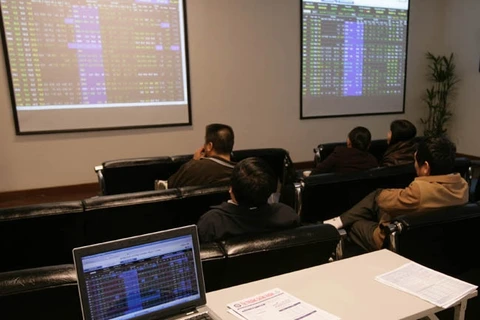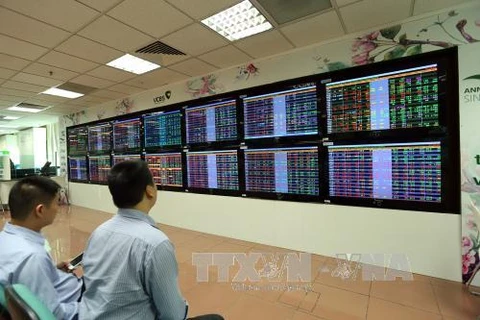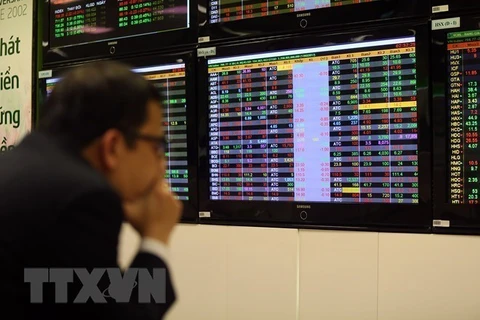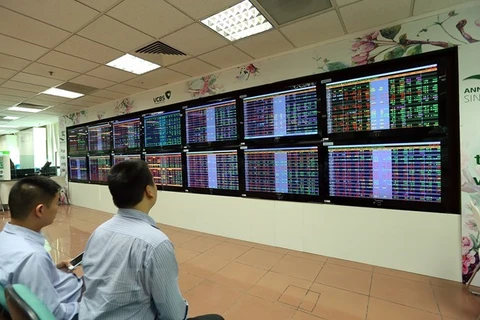Hanoi (VNS/VNA) - Shares in securities companies seem to have lost their shine for investors in the face of fierce competition from foreign-invested firms.
Securities stocks are favoured by speculative investors thanks to their high liquidity. However, this group has gone quiet in the latter half of this year despite several tides on the stock market.
Shares in big companies such as Saigon Securities Inc (SSI), Ho Chi Minh Securities Corp (HCM), VNDirect Securities Co (VND), Vietinbank Securities Co (CTS) and Sài Gòn-Hanoi Securities Co (SHS) have lost 20-50 percent of their value this year.
SSI, Vietnam’s biggest brokerage company, plunged 26.5 percent this year, sliding from nearly 27,000 VND (1.16 USD) to around 20,000 VND this week.
HCM has also lost more than 50 percent, closing December 10 at 22,800 VND.
The securities business is heavily affected by market movements. In an uptrend period, companies can earn big profits from margin lending, brokerage services or self-investment activities. By contrast, they can also incur losses during a bearish market.
Despite falling from the 1,000-point landmark in November, Vietnam’s benchmark VN-Index has increased nearly 8 percent so far this year. However, cash inflow has been slow and affected brokerage and margin lending at securities companies, dragging on their business results.
HSC reported net profit of just 305 billion VND (13 million USD) in the first nine months of this year, just half recorded in the same period of last year.
Ending September, SSI’s post-tax profit had decreased 44 percent on-year to 644 billion VND. SSI is also seeking shareholders’ approval to adjust its profit and revenue targets down this year to 1.1 trillion VND and 2.95 trillion VND, respectively, equivalent to decreases of 35.3 percent and 21.9 percent.
Profits of others such as VNDirect, Sai Gon-Hanoi and Vietcombank Securities also declined.
Besides, Vietnamese securities firms must compete with foreign-invested companies, especially those from the Republic of Korea. There are six Korean-invested securities companies operating in Vietnam: including KIS, Mirae Asset, Pinetree (previously known as HFT), KB Securities Vietnam, Shinhan Vietnam and NH Securities VN.
With strong financial backing, Korean investors have quickly increased their charter capital and become a formidable competitor for domestic firms.
Mirae Asset Securities in September approved a plan to raise its charter capital from 4.3 trillion VND to 5.5 trillion VND (237 million USD), which will make it the second biggest securities company in Vietnam (after SSI which is also planning to increase charter capital to more than 6 trillion VND through dividend payments).
KIS Securities also has a charter capital of nearly 2 trillion VND.
After being acquired by Hanwha Investment & Securities Co Ltd, Pinetree Securities also hiked its capital by six times, from 100 billion VND to 600 billion VND.
Pumped by big money, margin lending at these companies has developed strongly. The outstanding value of margin loans at Mirae Asset Securities has increased to 6.6 trillion VND, for the first time surpassing leading domestic securities firms – SSI with 5.31 trillion VND and HSC with 4.67 trillion VND.
Margin loans of other Korean companies also increased such as KIS (2.64 trillion VND), KB Securities Vietnam (1.8 trillion VND), not much inferior to large domestic firms such as VNDirect (2.95 trillion VND), Vietcombank Securities (2.9 trillion VND) and MB Securities (2.4 trillion VND).
The third-quarter top 10 biggest brokerage firms on the Ho Chi Minh and Hanoi stock exchanges also saw the presence of Mirae Asset and KIS.
Some companies are competing with zero fee policies offered by Pinetree with free lifetime transactions or Vietnam Cyberspace Securities Technology. Vietnamese companies – AIS Securities and VPBank Securities – have also introduced zero fee transactions for new investors for a certain period of time.
In the Republic of Korea, deposit interest rates are currently low at about 1-2 percent, so margin lending is an effective investment. Meanwhile, local securities companies struggle to borrow at low-interest rates to race to reduce fees and margin interest./.
VNA
























